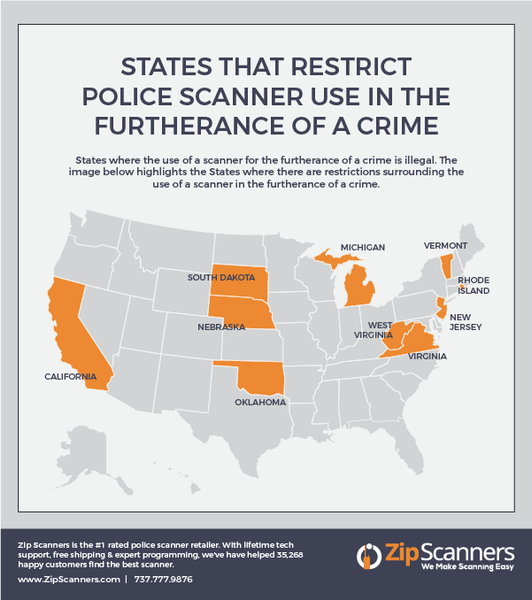Are Police Scanners Legal?
Yes, police scanners are legal to own and operate in the U.S.
Watch our tutorial video below to learn more.
Airwaves in the U.S. are public property and information sent over them does not presume privacy, which was established in the 1934 Communications Act.
Some radio bands are blocked on scanners; such as cell phones, military and government bands, and all other private agencies (where privacy is presumed), but all other frequencies are public until considered otherwise.
For a better understanding of radio bands in the U.S. and how they function and behave, please read Key Police Scanner Concepts & Overview.
While listening to radio bands on police scanners is legal in the U.S., there are 2 types of restrictions. These are not federal laws, but restrictions differ from state to state. These restrictions key in on:
- Use of a police scanner while driving*
- Use of a police scanner in the furtherance of a crime*
States That Restrict Police Scanner Use While Driving

Share this Image On Your Site
The image above highlights the U.S. states where there are restrictions surrounding the use of a scanner while driving.
Below is a link to each State’s statute.
While there is nuance appended to these laws, and some states such as Minnesota and Florida authorize use with a permit or a HAM radio license, they all have the same bottom line:
You cannot use a police scanner while operating a motor vehicle.
These laws were enacted to prevent users from listening to police communications with the intent to circumvent speed traps.
Most of these laws were intended for “fuzz busters," but they also apply to scanners.
Please note that police scanner apps are also covered by most of these statues. However, because scanner apps have fairly recently entered the public sphere, and there is pending litigation in several states, these laws will change as precedent case law is constituted.
States That Restrict Police Scanner Use in The Furtherance of a Crime

Share this Image On Your Site
The image above highlights the States where there are restrictions surrounding the use of a scanner in the furtherance of a crime.
Below is a link to each State’s statute.
- California
- New Jersey
- Michigan
- Oklahoma
- Rhode Island
- South Dakota
- Vermont
- Virginia
- Nebraska
- West Virginia
While there are nuances in each state, these laws all have the same bottom line:
If you utilize a police scanner in aid of a crime, you can be charged with an additional crime.
Penalties for this crime vary wildly from state to state. For example:
- Vermont: Up to 30 days in jail and a $250 fine.
- Rhode Island: Up to 5 years and a $5,000 fine.
While these laws are well-intentioned, they contain obvious oddities. An individual robbing a bank (a crime with the penalty of 5-25 years in federal prison) most likely will not be hindered by additional penalties. As in the case of many laws, penalties are elaborately layered.
Note: we are not licensed attorneys and we recommend that you consult an attorney if you have any questions about the specifics of these statutes. This article was written only to give surface-level background on the legality of police scanners.











































